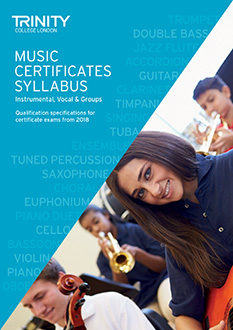Trinity’s Singing certificate exams offer an alternative to graded exams.
- Create your own mini-recital
- Available as a face-to-face exam
- Gain marks for programme planning, programme notes and stagecraft
- Receive precise and specific feedback to inform your continued musical development
- Prepare for Trinity’s Performance diplomas, which follow the same format as certificate exams
- There is no technical work and there are no supporting tests
Our music certificate exams are delivered as face-to-face exams only, open to all candidates, with no age restrictions or other limitations. There is no requirement to have passed lower levels, theory exams or other qualifications.
Choose from three levels of assessment representing key stages of musical development.
| Certificate level | Equivalent grade level |
| Foundation | Grade 3 |
| Intermediate | Grade 5 |
| Advanced | Grade 8 |
When choosing a programme, careful consideration should be given to both the musical and the lyrical suitability of the repertoire chosen to the age and gender of the individual candidate.
|
| Foundation | Intermediate | Advanced |
| Programme choice | Free choice of repertoire from the given list | At least one song must be performed from the Opera, Operetta, Sacred, Oratorio, Popular, Musical Theatre or Film traditions (i.e. Group A in the indicative list) | |
| Memory | Any or all songs may be performed from memory, which may improve note security and confidence. Although this is not compulsory and no additional marks are given for this, over-reliance on the score may inhibit communication and this can be reflected in the marks awarded. | ||
| Key | Songs may be performed in any key, either published or in a transposition supplied by the candidate. | ||
| Language | Songs may be performed in any language. | All songs must be performed in the original language*. At least two living languages (i.e. not Latin) must be used, one of which may be English. | All songs must be performed in the original language*. At least three living languages (i.e. not Latin) must be used, one of which may be English. |
*In cases where a work is by tradition performed in a variety of languages (e.g. Haydn's Creation/Schöpfung) any of the customary languages will be acceptable
For full details (including what you can sing, and how long your recital should be), please see the syllabus and repertoire lists.
Singing Foundation repertoire lists
Singing Intermediate repertoire lists
Singing Advanced repertoire lists
Further information
Full details (including our procedures, syllabus requirements, what to expect, and what to bring with you) can be found in our Information & Regulations.
Exam report forms are released typically within 1-2 weeks, enabling candidates to benefit from the detailed feedback whilst the exam experience is still recent. Certificates usually follow 4 weeks later. Occasionally, we may not be able to release the exam result straight away. Further details about this can be found on our music syllabus infringements page. For any other questions, please see our music exam help pages.
Information & Regulations Music syllabus infringements Music exam help